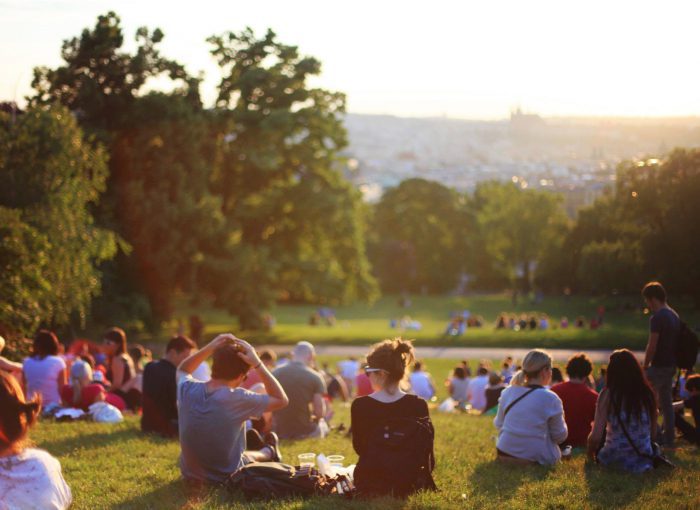By Lindsey Wright
I’m moving soon, and for the first time since I moved out of my parent’s house, I’ll be living in an unfurnished apartment. While I was excited about the apartment I’ll be moving into for other reasons, having to provide my own bed, desk, dresser, etc. was daunting. I had resigned myself to spending the rest of my summer visiting thrift store after thrift store between shifts at work. When my mom offered to post on Facebook asking if anyone had any furniture I could have, I agreed, and the results were fantastic. I was able to get all the furniture I needed for almost nothing.
I’m glad I was able to take care of a task that was stressing me out with relative ease. However, this situation has also reminded me of how privileged I am. My white middle-class mom and her white middle-class friends were able to provide for me, but there are many people out there who are also in need of furniture or other, even more, necessary items like food or toiletries. I was able to access what I needed because of the connections I have, or more accurately that my mother has, but what can we do to make needs accessible regardless of connections? This brings me to the topic of mutual aid.
Mutual aid is built around
the concept of solidarity, not charity.

In charity, support tends to be one-sided, with organizations providing for recipients by addressing the effects of inequality rather than the causes. Mutual aid involves cooperation among community members to address the needs of everyone; community is a big part of mutual aid. Organizers and volunteers work to build long-lasting connections between community members, creating a support system for the needs of everyone in the community.
To be honest, I’m quite new to the concept of mutual aid. I’ve volunteered with charities and nonprofits in the past, but as someone with social anxiety, I’ve always struggled with getting involved in my community and building those connections among neighbors. This is something I hope to change about myself in the upcoming school year by getting involved with YDSA @ UCF.
The Young Democratic Socialists of America (YDSA) @ UCF is an RSO on campus with a large focus on mutual aid. I’ve been aware of some of their events on campus in the past but have never gotten the chance to attend one myself. To get an idea of exactly what YDSA does and how they’re bringing mutual aid to UCF, I messaged Ciné Julien (he/they), Co-Chair for YDSA @ UCF.
I wanted to get an idea of what YDSA’s mission is with the events they hold and the initiatives they undertake. As I said, I’m a bit new to the concept, and I wanted to get a better idea of what mutual aid is, especially in the context of UCF.
Lindsey: What is YDSA’s goal with mutual aid?
Ciné: YDSA’s goal with mutual aid is to create community on UCF’s campus! Mutual aid is about equity and giving back in a meaningful and impactful way. Not everything is about giving money or fiscally giving back. We must get our hands dirty, work at the ground level, and engage as much as possible.
Once I had this framework in my mind, I asked about the specific initiatives YDSA has undertaken.
Lindsey: What are some of the mutual aid projects YDSA has done in the past?
Ciné: This past spring, we had a clothing drive for Trans, Gender Non-Conforming (GNC) and Non-Binary students in homage to Trans Visibility Day! It was a three-day event where we accepted donations of clothes, school supplies, hygiene products, shoes, and much more. We had about 200 people attend, and around 40% of that population were Trans, Non-Binary, and GNC! We donated a large amount of our excess donations to Out Of The Closet, which is an LGBTQ+ thrift store on Mills Ave (and other locations) that offers free HIV and AIDS testing and donates 96¢ of every dollar to HIV/AIDS services provided by the AIDS Healthcare Foundation (AHF). Prior to this event, we have done food shares and helped an organization called Pouring Out Refreshing Outreach (PORO) with their Kids Fun Day event!
Lindsey: And what are some of the projects you’re currently working on?
Ciné: Right now, we are currently working on helping Orlando DSA with their Community Garden Initiative; we are also organizing and accepting donations for our Materials Exchange so if anyone is in need of clothes or furniture, we have it on hand to give them. These materials will also be used for future drives we host. We’re also organizing another clothing drive in the fall, so keep an eye out if you would like to help with that project. Additionally, within our YDSA chapter, our Afro Socialists and Socialists of Color Caucus (AFROSOC) is organizing a Leftist Book Sale that will feature donated books, free materials, and items in which the proceeds will be going towards purchasing books for incarcerated folks in the Orlando Prison System. Lastly, we are finishing up organizing our Hygiene Kits Initiative! We are currently setting up kits to hand out to underserved, houseless folks of Orlando.
I was very excited to hear about all the opportunities UCF students have to engage in mutual aid and show solidarity with community members in the upcoming semester! However, with the past year fresh in my mind, I wondered how UCF students could get involved in mutual aid in their hometowns, or other communities they’re a part of besides UCF.
Lindsey: What can UCF students do to get involved with mutual aid/supporting their communities?
Ciné: Research and contribute to organizations that are already carrying out mutual aid projects and efforts. If you would like to get involved in mutual aid efforts in Orlando, I would highly suggest following Orlando DSA and Florida Access Network. For example, they prioritize volunteerism with mutual aid. In addition, think about how mutual aid can benefit the UCF RSOs you’re already involved in.
After speaking with Ciné, I now understand the great value of mutual aid. These events and initiatives are able to make a much larger impact than charities can, as the organizers are actually part of the communities the events are meant to benefit. I’m excited to get more involved with mutual aid both at UCF in the fall and in my hometown. When I’m done with the furniture I’m getting, I know YDSA will be the first place I look to pass it on to someone who needs it, just like I needed it.






